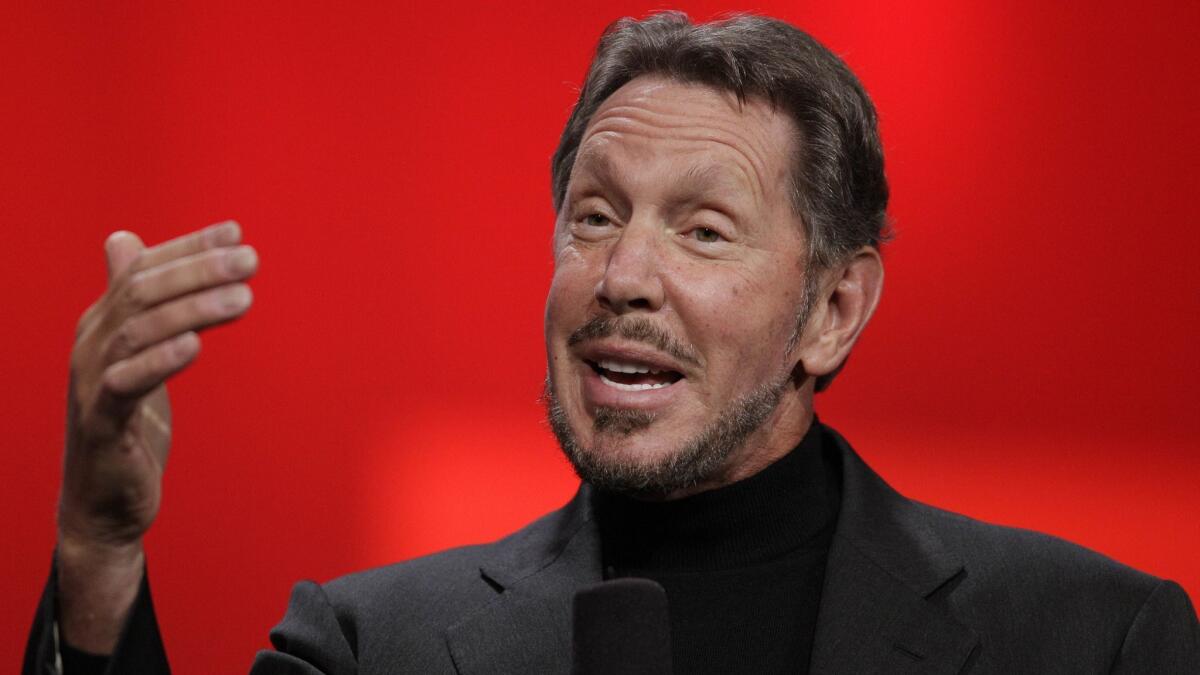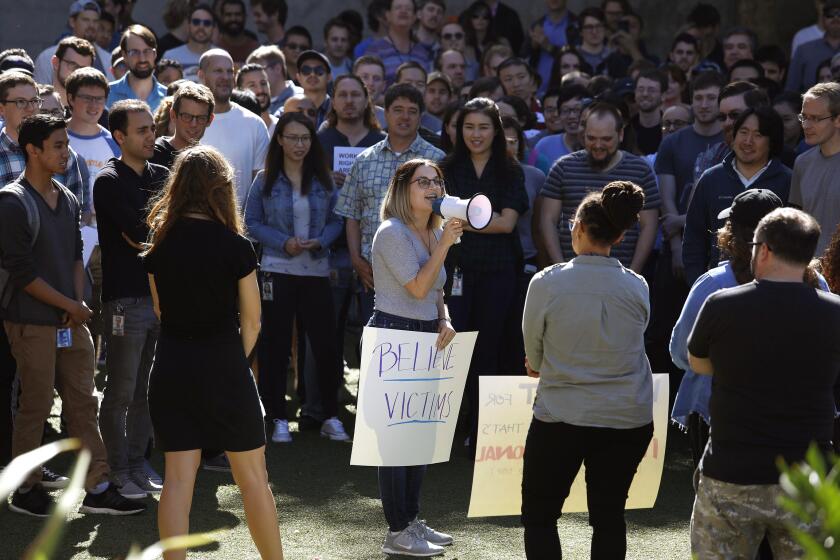Larry Ellison joins Peter Thiel in Trump’s camp

- Share via
Larry Ellison, the co-founder and executive chairman of Oracle Corp., is a fierce competitor, to put it mildly. This is a man who helped build a $177-billion company, and who likes to unwind by funding ludicrous hydrofoiling racing catamarans.
Increasingly, Ellison’s company is competing with the cloud computing wing of Amazon.com Inc., and he does it with zeal. Oracle funded an anti-Amazon group called the Free and Fair Markets Initiative to attack the rival. Oracle also worked desperately to derail Amazon’s bid for JEDI, a lucrative Defense Department cloud contract, going so far as to sue the federal government, alleging it illegally favored Amazon.
Now, Ellison is making friends with his enemy’s enemy, who happens to be the president of the United States. On Wednesday, Ellison will host a fundraiser for President Trump at his home in Rancho Mirage, Calif. Top contributors are expected to shell out $250,000 for a photo, a golf outing and a round-table discussion.
When 20,000 Google employees walked out in protest a year ago, it birthed a new era of tech workers banding together to influence their companies’ actions.
Trump has his own issues with Jeff Bezos, Amazon’s chief executive, who also owns the Washington Post. The paper’s coverage has consistently enraged the president, and Trump has made no secret of his dislike for Bezos, Amazon and the Post. Perhaps most delightfully to Ellison, the president articulated his desire to “screw Amazon” and block it from the JEDI contract, according to a book written by a former speechwriter for former Defense Secretary James N. Mattis.
Late last year, Amazon lost JEDI, short for Joint Enterprise Defense Infrastructure, to Microsoft, though a court on Thursday froze the contract as Amazon pursues a lawsuit against the government. Amazon is now the one accusing the government of political bias, citing the very public record on the matter.
Is Ellison’s interest in Trump inspired by their shared contempt for Bezos? Who knows? On one hand, it’s not out of character for Ellison to raise money for Republicans. He backed Marco Rubio in 2016.
Then again, backing Trump is uniquely controversial. Recode called Ellison “one of Silicon Valley’s most eccentric and independent-minded leaders,” observing that those traits might make him immune to “blowback” from Oracle workers. Silicon Valley workers in general have become more activist; in November 2018 Google employees walked out over the company’s sexual harassment policies.
It will be interesting to see who else — if anyone — from the Silicon Valley elite follows Ellison. If Sen. Bernie Sanders keeps racking up wins in the Democratic primary, will the capitalists in tech really support a self-proclaimed democratic socialist? Founders Fund partner Keith Rabois has said he’d vote for Trump over Sanders or Sen. Elizabeth Warren, who has proposed breaking up the big tech platforms. (Rank-and-file tech employees, meanwhile, seem happy to support Sanders, who received more money in political contributions from employees at big tech companies than any other presidential candidate in the last three months of 2019.)
In 2016, Rabois’ colleague Peter Thiel bet on Trump. He spoke in Trump’s support at the Republican National Convention. Thiel was basically alone in Silicon Valley in supporting the nominee that no one thought would win, but he continued to support the president in the face of near-universal disdain from the rest of the tech industry. That bet clearly brought Thiel closer to the president. In October, Thiel and Facebook Chief Executive Mark Zuckerberg dined at the White House.
Even when a president is unpopular with your employees, staying close to power has big benefits for business leaders. Apple Chief Executive Tim Cook has quietly kept the lines open to the president. Earlier this year, some tech industry bigwigs, including venture capitalist Marc Andreessen, Nextdoor.com Inc. CEO Sarah Friar and Silicon Valley Bank CEO Gregory Becker, dined with Secretary of State Michael R. Pompeo. A person familiar with the dinner told Bloomberg at the time that it was an attempt to drum up support for the Trump administration.
If people in Silicon Valley are coming around on Trump, they’re keeping it quiet for now. There are clearly risks associated with aligning with the president. But the owners of multibillion-dollar companies are well aware of potential benefits. And if they think he’s going to win, they could see risks to staying away, too.
More to Read
Inside the business of entertainment
The Wide Shot brings you news, analysis and insights on everything from streaming wars to production — and what it all means for the future.
You may occasionally receive promotional content from the Los Angeles Times.











